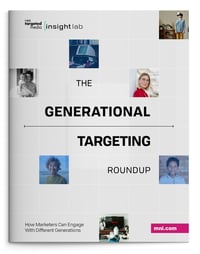
Generational Marketing: Marketing to the Generations
Generational research is fundamental to understanding who consumers are, what they value, and why they think and act the way they do.
Every generation has different values, habits, and demographics. With an understanding of those differences, you can form genuine connections with consumers of all ages. Here's how:
 Generational Segmentation: Make Connections That Count
Generational Segmentation: Make Connections That Count
Generational segmentation is a critical way of understanding the market. Across the board, consumers want personalized communications and experiences from brands they are considering and brands they already have an affinity for.
Baby Boomers (1946–1964)
Meet the generation that saw the Civil Rights Act, the Vietnam War and the first moon landing. Are you really surprised that cannabis usage has increased by 75% in this cohort from 2015-2018? It’s more likely to do so since the pandemic and legalization.
While many brands are obsessed with appealing to Millennials and desperate to get social love from
Gen Z, it’s the Baby Boomers who control more than 70% of the nation’s disposable income. As many of this cohort are now entering post-career lives, indulging grandchildren, and taking bike trips through Europe, you may want to give them your attention.
How to Market to Baby Boomers:
- Digitally Savvy—Baby Boomers prefer to shop online via computers and laptops as opposed to phones and tablets.
- Take Their Time to Buy—Boomers consider purchase as a commitment. They read the fine print and get into the nitty gritty so clear messaging is essential.
- Primed for SEO—96% of Boomers use search engines, making them a prime target for SEO efforts.
- Wary of Privacy Concerns—While re-targeting is an effective strategy, it puts Boomers on edge. They’ll respond better to shopping & Google search ads.
Gen X (1965–1980)
Sandwiched between Baby Boomers and Millennials, too often this cohort doesn’t get the attention it deserves. Gen X were the original latch-key kids (i.e., children hanging out at home without grown-up supervision after school since both parents were often working. Their childhood coincided with the emergence of the personal computer, and yet tech usage in their formative years was minimal compared to others.
How to Market to Gen X:
- In their highest-earning years and on their way to reaching the top of their profession—Gen X is financially stable. Ignoring them means missing a demogrphic that has impressive influence over both household and company decisions.
- Their famous self-reliance has made them awesome DIY’ers—Gen X has a hands-on approach to problem solving around the house.
- Value Authenticity—Gen X (as a whole generation) has seen the moon landing, the Cold War, the Y2K scare, and everything in between. They’ve also seen a lot of ads and been the target of a lot marketing, which means authentic brand messaging is very important.
Millennials (1981–1996)
Generation Me and The Peter Pan Generation are a couple of names they’ve been called. As the oldest millennials begin entering their 40s and economic realities hit, what they wouldn’t give to go back to the days when they could stumble out of bed and watch an episode or two of Arthur or Rugrats.
Growing up. millennials felt the impact of 9/11 and Hurricane Katrina. Just as they were entering the workforce, they were impacted by the 2008 recession. Many are still running catchup. When marketing to millennials, respecting their life-stage and value system goes a long way in forging connections.
How to Market to Millennials:
- Don’t Make Assumptions—Don’t assume you know them, understand them, or appreciate their needs. Take the time to listen. Make strategic decisions based on what you learn.
- Offer Purpose—Millennials have clear ideas of what they want and don’t want. They have incredible focus when their attention is caught and can smell disingenuous messaging from a mile away. Authenticity, social consciousness, real, raw, and relevant conversations are the way to connect.
Gen Z (1997–2015)
Understanding Gen Z is a must if marketers want to tap into their enormous influence and spending power. The first thing to know is don’t label them—see them solely as a cohort and not as individuals at your peril. Goal oriented, confident, and self-motivated are defining characteristics but since the pandemic, Gen Zs have also discovered that while success is nice, it’s not everything. Self-care is most important.
How to Market to Gen Z:
- Personalized email marketing—Shocking but true: Gen Z enjoys personalized emails but be mindful of how often you’re reaching out and why. Include something in your messaging—an offer, an experience, and anything that includes free food or goodies!
- Quick, Captivating Video Content—Gen Z has grown up with short form video. First Vine, and now TikTok. Keep videos short, fun, and shareable.
- Gen Z consumers are particular about brand engagement, perception, and loyalty. MNI provides stats & trends to understand how to capture Gen Z. Curious? Download the E-Book here.
Gen Alpha (2016–Present)
The alphabet ends after z. So then, what comes next? Generation Alpha. By 2025 Generation Alpha, primarily raised by Millennial parents, is expected to be the wealthiest, most educated and technologically literate generation in history. While still very young—the oldest Alphas currently being only age 6— this generation is already making an impression.
Key Insights:
- 88% of Gen Alpha agrees with the statement that they are “close with their parents”.
- Gen Alpha has moved from Pester Power to Collaborative Buying with their parents and guardians, and has real influence on everything from automobiles purchased to vacations taken.
- Gen Alpha is technologically savvy across screens.
- The environmental impact of what brands do is important to them.
- They only know seamless, personalized online experiences.
- They have digital footprints (even if they don’t know what that means).
- They are super inclusive and aware of public image.
 Downloadable: The Generational Marketing Cheat Sheet
Downloadable: The Generational Marketing Cheat Sheet
Sometimes you just need the facts. Download the attached, tuck it in the back of your notebook (or keep it on your desktop) and refer to it as needed.
About MNI
Generational research is fundamental to understanding who consumers are, what they value, and why they think and act as they do. This is our sweet spot. MNI Targeted Media is an insights and strategy group, a national advertising, technology, and data company. We go deep into behavior insights and anticipate trends, so companies are primed for what’s happening now and next.









